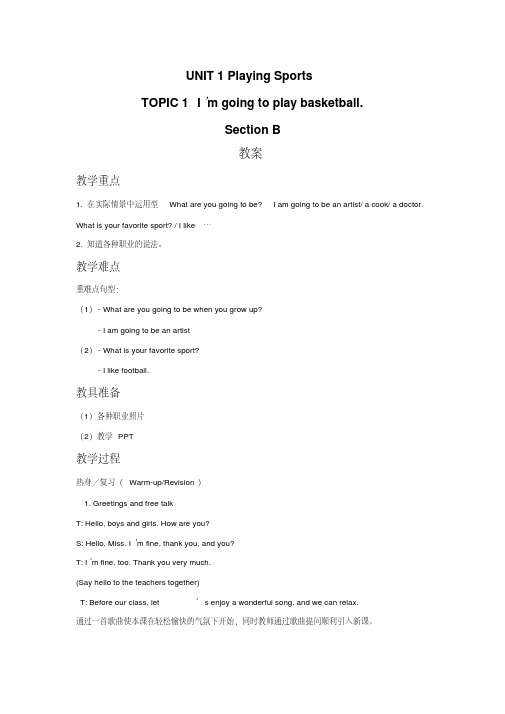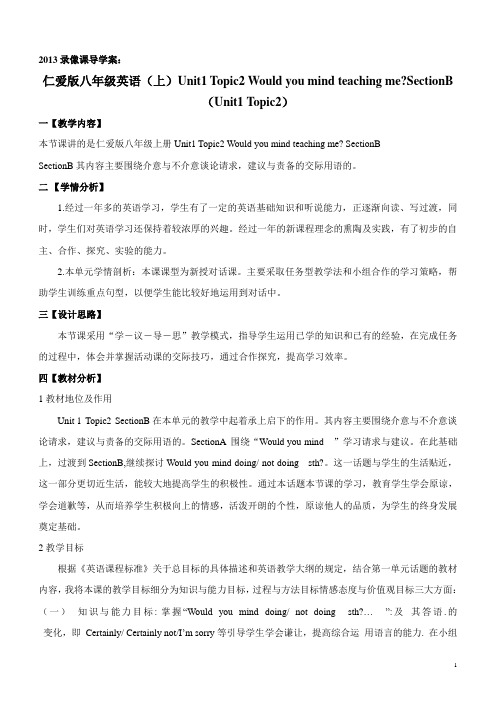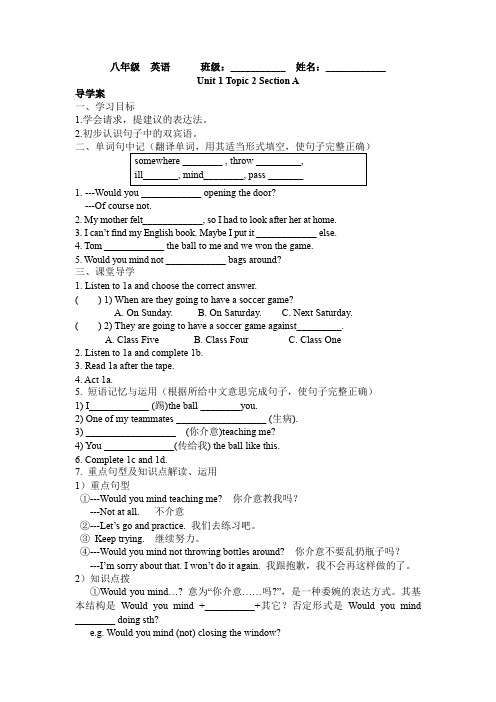八年级英语导学案Unit1Topic2sectionB
仁爱版八年级英语上册UNIT1TOPIC1SectionB教案

fantastic.
Students repeat.
T: OK, now please tell me, what are you going to be when you grow up?
Ss: …
Write on the blackboard. Read the sentences.
Make a dialog. Show some pairs.
… but do you know what things
… should do? Ss:
…
T: Yes, you are right. Well
…teaIctheinrks can do so many things, let
’ s have a loes.
T: The teachers can design a class, learn knowledge and play with children. L ook. Wow, that ’ s
(Say hello to the teachers together)
T: Before our class, let
’ s enjoy a wonderful song, and we can relax.
通过一首歌曲使本课在轻松愉快的气氛下开始,同时教师通过歌曲提问顺利引入新课。
呈现新课
1. Lead in. T: What a wonderful song! That sounds great. Do you know who sings the song? Ss: … T: Yes, you are right. XXX is a famous singer, and there is another famous person, I think maybe you know him. What is your favorite activity? Ss: I like play basketball after school. T: That ’s great! Show the picture of Yao Ming. T: He is Yao Ming, he is a basketball player. Singer and basketball player are jobs. Now there are many other jobs, do you want to know what they are? Ss: Yes. T: OK, I will show you. Show many pictures. Let students talk about what they are, then check them. T: Do you know what else jobs? Ss: … T: Today I want to show you other two jobs, they are player and teacher. 2. New knowledge. Show the pictures of player and teacher. Students read the words follow the teacher. Read the words one by one. T: Do you want to be a player? Ss: … T: Do you want to be a teacher? Ss: … T: I am going to be a player. I am going to be a teacher. Write on the blackboard. Students follow the teacher to read the sentences. 3. Ask and answer T: They are both good jobs, but I think maybe in the future, you will be only one of them, so please tell me, what are you going to be when you grow up?
仁爱版英语八年级上册Unit 1 Topic 2 Section B教案

能够正确使用动词的双宾结构,谈论表达歉意和接受道歉的话题。
4、学情分析:
学生的英语发音不是很正确,要在音标的辨识方面下点功夫,同时要求学生在日常口语中反复地能正确地表达不确定观点,这一点有点难以把握。
二、学习目标
1、能正确会读,说出、写出P11-12的生词,并能进行英汉互译
2、熟读1a,能够说出1a的知识点,能正确表达歉意和接受道歉。
5.Don’t be angry with each other.
2.学生通过熟读1a,能够说出1a的知识点,能够熟练运用知识点做题。
say hello/sorry/thanks/goodbye to sb.
对某人问候/道歉/道谢/道别
1.do one’s best = try one’s best尽力,努力
1.fight v.
fight with sb.
n. have a fight
2.finish +v-ing
3.It’s nothing.用来回答别人的道歉。
4.do one’s best to do sth.
学习目标
教学活动
评价要点
要点归纳
目标2、熟读1a,能够说出1a的知识点,能正确表达歉意和接受道歉。
基于“课程标准、中招视野、两类结构”
八(上)Unit1 Topic2Section B教案设计
一、学习目标确定的依据:
1、课程标准相关要求:《英语课程标准》(2011年版)要求学生能够会读会写知汉意的单词和短语
单词:fight angry nothing finish grandfather teamwork
2.Sentences with direct and indirect object structure.
仁爱版八年级上册Unit1topic2section市级优质课导学案2013年春期

2013录像课导学案:仁爱版八年级英语(上)Unit1 Topic2 Would you mind teaching me?SectionB(Unit1 Topic2)一【教学内容】本节课讲的是仁爱版八年级上册Unit1 Topic2 Would you mind teaching me? SectionBSectionB其内容主要围绕介意与不介意谈论请求,建议与责备的交际用语的。
二【学情分析】1.经过一年多的英语学习,学生有了一定的英语基础知识和听说能力,正逐渐向读、写过渡,同时,学生们对英语学习还保持着较浓厚的兴趣。
经过一年的新课程理念的熏陶及实践,有了初步的自主、合作、探究、实验的能力。
2.本单元学情剖析:本课课型为新授对话课。
主要采取任务型教学法和小组合作的学习策略,帮助学生训练重点句型,以便学生能比较好地运用到对话中。
三【设计思路】本节课采用“学-议-导-思”教学模式,指导学生运用已学的知识和已有的经验,在完成任务的过程中,体会并掌握活动课的交际技巧,通过合作探究,提高学习效率。
四【教材分析】1教材地位及作用Unit 1 Topic2 SectionB在本单元的教学中起着承上启下的作用。
其内容主要围绕介意与不介意谈论请求,建议与责备的交际用语的。
SectionA 围绕“Would you mind ”学习请求与建议。
在此基础上,过渡到SectionB,继续探讨Would you mind doing/ not doing sth?。
这一话题与学生的生活贴近,这一部分更切近生活,能较大地提高学生的积极性。
通过本话题本节课的学习,教育学生学会原谅,学会道歉等,从而培养学生积极向上的情感,活泼开朗的个性,原谅他人的品质,为学生的终身发展奠定基础。
2 教学目标根据《英语课程标准》关于总目标的具体描述和英语教学大纲的规定,结合第一单元话题的教材内容,我将本课的教学目标细分为知识与能力目标,过程与方法目标情感态度与价值观目标三大方面:(一)知识与能力目标: 掌握―Would you mind doing/ not doing sth?… ‖:及其答语.的变化,即Certainly/ Certainly not/I‘m sorry等引导学生学会谦让,提高综合运用语言的能力. 在小组合作、交流过程中提高语言技能,综合运用语言的能力。
仁爱版英语八年级上册Unit1Topic2SectionA优秀教学案例

一、案例背景
本案例背景以仁爱版英语八年级上册Unit1Topic2SectionA为主题,主要围绕“询问时间和日期”展开。本节课的主要内容是让学生掌握询问时间和日期的表达方式,如“What time is it? What day is it today? What date is it today?”等,并能够运用这些表达方式进行实际交流。通过本节课的学习,学生能够提高自己的英语听说能力,增强对时间日期表达方式的掌握,为日常生活交流打下基础。
3.鼓励学生进行自主学习,如查阅相关资料、观看英语视频等,提高他们的学习兴趣和能力。
4.教师对学生的作业进行批改,及时给予反馈和指导,帮助学生提高。
五、案例亮点
1.真实情境的创设:通过模拟不同场景下的时间日期交流,让学生身临其境地感受和学习英语,提高他们的语言运用能力和情境交际意识。
2.问题导向与小组合作:设计具有挑战性和思考性的问题,引导学生进行探究式学习,激发学生的思维潜能和团队合作精神。
3.多元化的教学评价:关注学生的全面发展,既注重知识的掌握,也重视能力的培养和个性源自发展,体现了“以人为本”的教育理念。
4.学生为主体的教学模式:充分调动学生的积极性,让他们在自主学习、合作交流中,提高自己的英语水平,培养了他们的独立思考能力和自我管理能力。
5.跨文化交际的培养:在教学过程中,注重让学生了解和感受不同文化背景下的时间日期表达方式,提高他们的跨文化交际意识和能力。
3.设计角色扮演活动,让学生分别扮演不同角色,如酒店前台、火车售票员等,进行realistic conversations,提高他们的口语表达能力。
(二)问题导向
1.设计一系列问题,引导学生思考和探讨时间日期的表达方式及其在实际生活中的重要性,如:“为什么我们需要询问和表达时间日期?”“在不同的场合,我们如何运用时间日期表达方式?”等。
仁爱英语(新)八年级上unit2topic2sectionb优秀教学案例

本环节通过展示一段关于学生们日常活动的视频,激发学生的学习兴趣,引导学生思考和讨论他们自己的日常活动。教师通过提问方式引导学生回顾上一节课的内容,为新课的学习做好铺垫。
(二)讲授新知
本环节主要讲解一般现在时的用法和动词短语的描述日常活动。教师通过生动的语言和示例,让学生理解一般现在时的概念和用法,并通过互动方式,让学生积极参与,巩固所学知识。同时,教师引导学生运用动词短语描述自己的日常活动,提高他们的语言运用能力。
仁爱英语(新)八年级上unit2topic2sectionb优秀教学案例
一、案例背景
本案例背景以“仁爱英语(新)八年级上Unit2 Topic2 Section B”为主题,旨在通过深入挖掘课本内容,结合学科特点,设计出一堂既实用又有趣的教学课堂。本节课主要围绕“询问时间和谈论日常活动”的话题展开,通过学习本节课,学生能够掌握一般现在时的运用,灵活运用动词短语描述日常活动,并能够询问他人的日常安排。在教学过程中,教师需要充分考虑学生的认知水平和生活经验,通过创设真实的生活情境,激发学生的学习兴趣,提高他们的语言运用能力。同时,教师还需注重培养学生的合作意识,让他们在小组活动中相互交流、共同进步。
4.反思与评价:教师引导学生对课堂教学进行反思,总结学习收获,提高了学生的自我评价能力。同时,学生之间的互评和教师的评价,使得学生能够更好地了解自己的不足,提高了学生的综合素养。
5.教学方法多样:本节课采用了情境教学法、任务型教学法、交际式教学法等多种教学方法,丰富了教学手段,激发了学生的学习兴趣。教师注重个体差异,因材施教,使得每个学生都能在课堂上得到充分的锻炼。
(五)作业小结
本环节教师布置作业,让学生运用所学知识,完成相关的练习题。作业包括填写时间表格、用动词短语描述日常活动等,让学生在课后巩固所学知识,提高他们的实践能力。同时,教师鼓励学生在课后主动与同学交流,分享学习心得,培养他们的合作意识。
人教版八年级上册英语单元教案(含教材分析)--Unit 1

Unit 1Where did you go on vacation?本单元教材以Where did you go on vacation?为中心话题,围绕着描述“过去发生的事情”展开,学习和运用一般过去时态的一般疑问句Did you go/see/buy...?和特殊疑问句Where/What/How...?询问过去的事件,让学生学会谈论和分享过去发生的事件。
本课教学内容与学生的实际生活密切相关,易于引发学生运用简单的英语进行交流。
在学习活动中,学生通过交换对过去发生的事情的描述及看法,促进学生之间和师生之间的情感交流,增进情谊。
Section A的主要学习内容是:复习一般过去时态和动词的规则与不规则变化,学习一般过去时态的一般疑问句:Did you...?及不定代词的用法。
Section B安排了许多听、说、读、写的任务活动,教师在教学中可以灵活运用这些活动,将其中的一些活动进行变化或整合,充分调动学生参与的积极性,提高学生的听说读写能力。
第一课时Section A(1a-2d)Teaching Goals【教学目标】Key words & phrases:anyone,anywhere,wonderful,few,most,quite a few,go on vacationKey sentences:1.Where did you go on vacation?I went to the mountains/New York City/summer camp/the beach.2.Did you...?Yes,I did./No,I didn't.Teaching Key Points【教学重点】The vocabulary:New York City,Central Park,few,most,quite a few,on vacationTarget language:Where did you/they/he/she go on vacation?I/They/He/She went to the mountains/New York City/summer camp/the beach. Did you...?Yes,I did./No,I didn't.Teaching Difficult Points【教学难点】Use the target language above to talk about past events.Teaching Aids【教学工具】An English textbook,a tape recorder,CAI or courseware.Teaching Steps【教学过程】★Step 1Leading inGreet the class and introduce what to learn in this period.Teacher:Welcome back to school!Did everyone have a good time during the summer vacation?Today we'll begin to learn the topic where you went on vacation.Teacher:Where did you go on vacation?Students:______.①I went to the mountains.②I visited museums.…★Step 2Pre-taskPage 1,1a & 1b.1.Look at the picture.2.Match each activity.3.Check the answers in 1b.4.Practice reading.Page 1,1c.1.Focus on the conversation in the box.2.Practice reading.3.Pairwork:Where did you go on vacation?I...4.Groupwork:Divide the class into groups of four or five. Make conversations.First S1 to S2:S1:Where did you go on vacation?S2:I...S1:Where did she/he go on vacation?S2:She/He...★Step 3While-taskPage 2,2a & 2b.1.Play the recording for the first time. Students complete the chart in 2a.2.Check the answers.(Point to one student who raises his or her hand.)3.Play the recording a second time and say:There are three conversations. The people talk about where they went on vacation. Listen to the recording and check(√)Yes,I did or No,I didn't for each question.4.Correct the answers.★Step 4Post-taskPage 2,2c & 2d.1.Focus on the conversation in 2c & 2d.2.Practice reading. Make students scan the conversations first.3.Teach and then make students role-play the conversation in pairs.4.Have a group of students present their conversation to the class.★Step 5Homework1.Practice the conversation on Page 2,2d.2.Do the exercises on Page 1 in students' book.Board Design板书设计Unit 1Where did you go on vacation?The first period Section A(1a-2d)1.Key vocabulary:anyone,anywhere,wonderful,quite a few,go on vacation 2.Target language:A:Where did Tina go on vacation?B:She went to the mountains.第二课时Section A(GF-3c)Teaching Goals【教学目标】Key words:something,nothing,everyone,myself,yourself,someone,seem,bored,diaryKey phrases:go out,have a good time,of course,keep a diaryKey sentences:1.Where did you go on vacation?I went to New York City.2.Did you go out with anyone?Did you buy anything special?3.How was the food?How was your vacation?Teaching Key Points【教学重点】The vocabulary:something,nothing,everyone,myself,yourself,someone,seem,bored,diary,go out,have a good time,of course,keep a diary,on vacation Target language:How was the food?Everything tasted really good!Did you go shopping?Of course!Did everyone have a good time?Oh,yes. Everything was excellent.Teaching Difficult Points【教学难点】e the target language above to talk about past events.2.The usage of someone,anyone,everyone,no one,something,anything,everything,nothing.Teaching Aids【教学工具】An English textbook,CAI or courseware.Teaching Steps【教学过程】★Step 1Leading in(T—teacher S—student)T:Where did you go last weekend?S:I went to the beach.T:Did you go there with anyone?S:Yes. I went to the beach with my brother.T:Did you have a good time there?S:...★Step 2Pre-taskPage 3,Grammar Focus.1.Review the grammar box. Work in pairs. One asks and the other answers.2.Practice reading the sentences in the chart.★Step 3While-taskPage 3,3a & 3b.1.Teach these new words:anyone,something,anything,everything,nothing,everyone,no one.2.Call students' attention to the conversation in 3a. Make students complete it individually.3.Choose a student to give his or her answers. Write the answers on the board.4.Correct the answers.5.Lead students to read this conversation.6.Have students work in pairs and role-play the conversation. As they talk,move around the classroom monitoring their work. Offer language or pronunciation support as needed.7.Make students complete the blanks in the e-mail message in 3b with the words in the box.8.Check the answers and then make students practice reading it.★Step 4Post-taskPage 3,3c.Complete the task in 3c.Ask your group questions about their last vacation. Then tell the class your results.★Step 5Homework1.Review the indefinite pronouns learned in this period.2.Do the exercises on Page 2 in students' book.Board Design板书设计Unit 1Where did you go on vacation?The second period Section A(GF-3c)1.The vocabulary:something,nothing,everyone,someone,myself,yourself,go out,of course2.Target language:①A:Where did you go on vacation?B:I went to New York City.②A:Did you buy anything special?B:Yes,I bought something for my father.3.Structure:something special4.Answers to 3a and 3b.第三课时Section B(1a-1e)Teaching Goals【教学目标】Key words:delicious,exciting,terrible,expensive,cheap,boringKey sentences:1.Where did Lisa go on vacation?2.Did she do anything special there?Did she buy anything for her best friend?Did Lisa like her vacation?3.How was/were...?Teaching Key Points【教学重点】The vocabulary:delicious,exciting,terrible,expensive,cheap,boringTarget language:Where did Lisa go on vacation?Did she do anything special there?Did she buy anything for her best friend?How was/were...?Teaching Difficult Points【教学难点】1.询问去过何地以及感受(评价)Where did you go?I went to the beaches. How was it?It was exciting.2.Use the target language to talk about your past events.Teaching Aids【教学工具】An English textbook,a tape recorder,CAI or courseware.Teaching Steps【教学过程】★Step 1Leading in1.Greetings.2.T:Where did you go on vacation?S:I went to summer camp.T:Did you do anything special there?S:Yes,I...T:Did you buy anything for your parents or friends?S:Yes,I bought...for.../No,I bought nothing.T:How was/were...?S:It was/They were...★Step 2Pre-taskPage 4,1a & 1b.1.Look at the six pictures.2.Match the words with the pictures.3.Students complete the task in 1b individually.4.Check the answers.★Step 3While-taskPage 4,1c & 1d.1.Make students scan the questions in 1c.2.Play the recording for the first time. And say:Listen to the tape. Lisa is talking about her vacation. Complete the four questions.3.Play the recording a second time. Students complete the task in 1d.4.Correct the answers.★Step 4Post-taskPage 4,1e.Ask 3 or 4 students to answer questions about Lisa's vacation. You can begin your questions with:Where did...?What did...?Did she...?How was...?How were...?★Step 5Homework1.Review these sentences:Where did...?Did...?How was/were...?2.Do the exercises on Page 3 in students' book.Board Design板书设计Unit 1Where did you go on vacation?The third period Section B(1a-1e)1.Words:delicious,exciting,terrible,expensive,cheap,boring2.Sentences:①Where did Lisa go on vacation?②Did she buy anything special?③Did she buy anything for her best friend?④Did Lisa like her vacation?3.Answers to Activity 1a:1—5f a c e b dAnswers to Activity 1b:wordsdeliciousexcitingcheapwordsterribleexpensiveboring第四课时Section B(2a-2e)Teaching Goals【教学目标】Key words:activity,decide,try,bird,bicycle,building,trader,wonder,difference,top,wait,umbrella,wet,below,enough,hungry,asKey phrases:feel like,because of,go to the beach,a lot of,a little,take the train,too many,what aboutKey sentences:1.I wonder what life was like here in the past.2.What a difference a day makes!3.We waited over an hour for the train because there were too many people.Teaching Key Points【教学重点】Learn Jane's diary entries about her vacation.1.The vocabulary:activity,decide,try,wonder,difference,wait,below,enough,hungry,as,feel like,because of2.Target language:I wonder what life was like here in the past. We waited over an hour for the train because there were too many people.Teaching Difficult Points【教学难点】1.because and because of2.What a difference a day makes!3.Learn to write a diary.Teaching Aids【教学工具】An English textbook,CAI or courseware.Teaching Steps【教学过程】★Step 1Leading in1.Greetings.2.Introduce what to learn in this period,especially the articles in 2b,Jane's diary entries. Teacher begins like this:Today we'll focus on two diary entries about Jane's vacation. Through the learning you'll know how to write a diary. Let's begin now.★Step 2Pre-taskPage 5,2a & 2b.1.Review and discuss the questions in 2a box with your partner.2.Project these new words on the screen or write them on the board and teach the new words. Ask students to repeat them. And make sure everyone knows the meanings.activity n.活动;decide v.决定;try v. & n.尝试,设法;wonder v.想知道;difference n.差异;top n.顶部;wait v. & n.等待;umbrella n.伞;below prep.& adv.在……下面;enough adj.充足的;hungry adj.饥饿的3.Make students scan the articles first. Ask students to put a mark in contents that are unfamiliar to them. Then the teacher lead students to learn these two articles sentence by sentence. Pay attention to these points:(1)decide v.决定;decide to do sth.决定做某事;(2)try v.尝试;try doing sth.尝试做某事;try to do sth.尽力做某事;(3)below prep. & adv.在……下面;(4)feel like 给……的感觉;(5)because and because of;(6)wonder v.想知道4.Practice reading.★Step 3While-taskPage 6,2c & 2d.1.Make students read Jane's diary entries again. Fill in the chart in 2c.2.Students complete the conversation in 2d using the information in Jane's dairy entries.3.Choose 3 or 4 students to give their answers.4.Correct the answers.5.Have students work in pairs. Student A will be Anna and student B will be Jane. Act the conversation out.★Step 4Post-taskPage 6,2e.1.Make students complete the blanks in 2e.2.Ask one student to write his or her answers on the board.3.Check the answers together with the class.4.Practice reading.★Step 5Homework1.Write a diary.2.Do the exercises on Page 4 in students' book.Board Design板书设计Unit 1Where did you go on vacation?The fourth period Section B(2a—2e)1.Key vocabulary:decide,try,wonder,difference,top,wait,below,enough,hungry,as,feel like,because of,too many2.Sentences:①I wonder what life was like here in the past.②And because of the bad weather,we couldn't see anything below.第五课时Section B(3a-Self Check)Teaching Goals【教学目标】Key words & phrases:duck,dislike,take photos,Tian'anmen Square,the Palace Museum,bring back,shopping center,have a fun time,school trip,come upKey sentences:1.How did you feel about the trip?2.It was so beautiful that we forgot about the last five hours!Teaching Key Points【教学重点】The vocabulary:dislike,take photos,Tian'anmen Square,the Palace MuseumTarget language:What did you like best?Did you dislike anything?How did you feel about the trip?Teaching Difficult Points【教学难点】Write a travel diary.Teaching Aids【教学工具】An English textbook,CAI or courseware.Teaching Steps【教学过程】★Step 1Leading in1.Greetings.2.T:Beijing is the capital of our country. It's famous for its long history and places of interest,such as Tian'anmen Square,the Palace Museum,the Summer Palace and so on. And Beijing duck is very delicious. Have you ever been to Beijing?Tell your travel to us.★Step 2Pre-taskPage 7,3a.1.Look at the three pictures.2.Use the words and phrases in the box to complete the blanks in the article.3.Check the answers.★Step 3While-taskPage 8,Self Check.Complete the tasks in Self Check.1.Have students complete the task of Part 1.Then Choose 2 or 3 students to give their answers. Check the answers.2.Induct students to complete the passage of Part 2.Check the answers.3.Practice reading.★Step 4Post-taskPage 7,3b & 3c.1.Make students answer the questions in 3b and take notes.2.Teach students how to write a travel diary.3.Students write a travel diary like Jane's on Page 5 using the notes in 3b.4.Choose 2 or 3 students' diaries. Make students read them out. Point out the weakness and induct the students to correct their diaries.★Step 5Homework1.Write a travel diary.2.Do the exercises on Page 5 in students' book.Board Design板书设计Unit 1Where did you go on vacation?The fifth period Section B(3a-Self Check)1.Key vocabulary:dislike,Tian'anmen Square,the Palace Museum,have a fun time,come up2.Sentences:①Did you dislike anything?②How did you feel about the trip?③My legs were so tired that I wanted to stop.。
仁爱版英语 八年级上册 Unit 1 Topic 2 导学案

八年级英语班级:___________ 姓名:____________Unit 1 Topic 2 Section A导学案一、学习目标1.学会请求,提建议的表达法。
2.初步认识句子中的双宾语。
1. ---Would you ____________ opening the door?---Of course not.2. My mother felt____________, so I had to look after her at home.3. I can’t find my English book. Maybe I put it ____________ else.4. Tom ____________ the ball to me and we won the game.5. Would you mind not ____________ bags around?三、课堂导学1. Listen to 1a and choose the correct answer.( ) 1) When are they going to have a soccer game?A. On Sunday.B. On Saturday.C. Next Saturday.( ) 2) They are going to have a soccer game against_________.A. Class FiveB. Class FourC. Class One2. Listen to 1a and complete 1b.3. Read 1a after the tape.4. Act 1a.5. 短语记忆与运用(根据所给中文意思完成句子,使句子完整正确)1) I____________ (踢)the ball ________you.2) One of my teammates __________________ (生病).3) __________________ (你介意)teaching me?4) You ______________(传给我) the ball like this.6. Complete 1c and 1d.7. 重点句型及知识点解读、运用1)重点句型①---Would you mind teaching me? 你介意教我吗?---Not at all. 不介意②---Let’s go and practice. 我们去练习吧。
Unit 1 Topic 2 We should learn teamwork(仁爱版八上)

Unit 1 Topic 2 We should learn teamwork.(导学案)Section A一.课前小测(复习Topic 1重点句型)1.我打算打篮球。
I _______________________________ basketball.2.你打算加入学校划船队吗?__________ you ______________________ the school rowingteam?3.你长大时打算做什么?我打算做一名科学家。
What ________ you __________________when you ________ ________? I am going to _________________________.4.我希望我们的队会赢。
I _________ our team __________ __________.5.游泳和划船,你更喜欢哪一项?我更喜欢划船。
__________________ do you _________,swimming ________ rowing? I _______________________.二.知识点导航1.But one of my teammates fell ill.但是我的一个队友病了。
one of +the+最高级+ 复数“最……之一”fall ill / be ill生病练习:1).孙杨是最受欢迎的运动员之一。
Sun Yang is one of _______________________________________________________.2).她的爷爷病了,她得留在家里照顾爷爷。
Her grandfather __________________ and she ________________ stay at home and look after him.2.Would you mind teaching me?请你教我,好吗?Would you mind not throwing bottles around?请你不要乱扔瓶子,好吗?动词mind后加doing,表示介意做某事。
- 1、下载文档前请自行甄别文档内容的完整性,平台不提供额外的编辑、内容补充、找答案等附加服务。
- 2、"仅部分预览"的文档,不可在线预览部分如存在完整性等问题,可反馈申请退款(可完整预览的文档不适用该条件!)。
- 3、如文档侵犯您的权益,请联系客服反馈,我们会尽快为您处理(人工客服工作时间:9:00-18:30)。
6、随手笔记
5.He did his best ,and he
…
do one ’ s best=try one 尽’某s人b最es大t 的努力
do one ’ s best to do sth.=try on做某事。
6. be angry with sb 生 …的气 7. say sorry to sb 向某人道歉
白衣二中 八年级英语(上)导学案
<教材信息 > 章节: Unit 1 课题 : Topic 2 Section B 课时编号: 6
<教师信息 > 主备人:白卫红
备案时间: 2013、 9 实施人:
实施时间:
<学生信息 > 班级:
姓名:
所属小组:
<学习目标 >1、知识目标: ( 1).预习本课单词和词组。
9.have a fight (with sb ) . 意思为 “(和某人)打了一架 ”。Fight 在这儿是名词。 have a fight with sb.= fight with sb. 但 fight with sb 中的 fight 是动词。
10.with the help of 意思…为 “在… 的帮助下 ”。
1、识记单词, 熟读课文
1.朗读 1a 对话,翻译对话内容; 合作交流:
2.独立完成 1b.
2、学用工具 3、小组合作
3.What do you mean by saying that? What do you mean by … ?= What does … mean?= What ’ s the meaning of
_____________________
(2.) 进 一 步 学 习 提 出 要 求 的 句 型 Would you mind (not) doing sth.?/Will you 及…其?答语。
2、能力目标:会使用道歉及应答用语 3、情感目标:培养学生的团队意识
<重难点预设 > 联系一般将来及一般过去式;表示道歉和应答的用语 <教学设备 > 多媒体,图片, 学习过程:
达标测试:
1. 根据汉语和首字母提示完成句子。
1.Mary was a c
gile.She lost her key yesterday.
2.Beijing held the Olympics.It was really a good c
for us to study English.
3.The teacher
教师
温故知新: 写出下列短语的同意短语 1. help sb. = __________________ 2.be ill = __________ 3.do well in = _____________
“复 备 ”栏或 学生笔记栏
4. throw sb. sth. = _______________ 5.Class Five = ______________ 自主学习 :
_________________________________________________________________________
____________________________________________________________________________
____________________________________________________________________________
(生 … 气) them because they
(打了一架) yesterday.
4.The radio is too loud. Would you mind
(调低一点)?
5.Your shoes are very d
.You ’ d better wash them right away.
反思与评价:
8. be sure to do sth. 确信做某事 be sure that … 意思为 “确信 …”3. Would you mind …… ?
( 1)Would you mind teaching me? = Would you please teach me? 你教我好吗? Would
be sure of/about 对 ……确信 /肯定 /有把握,后面可以跟名词或代词。
11.turn down 把音量调低 turn up 把音量开大 turn on 打开 turn off 关掉
13.I ’ m sorry./Sorry抱. 歉 I ’ m sorry for/ I
’ m sorry to do sth./ I 很抱歉’ m…sorry that
展示自我
展示合作交流内容,大胆提出质疑。
意思为 “…是什么意思 ”。
4 、学会虚心 …倾?听,学会上
课专注。
4.You shouldn ’ t shout at me.
5 、学会质疑
(1) shout 意思为 “喊叫 ” (2) shout at sb.意思为 “冲某人(生气地)喊叫 ” (3) shout to sb. 和解疑。
意思为 “朝某人高声说 ”
